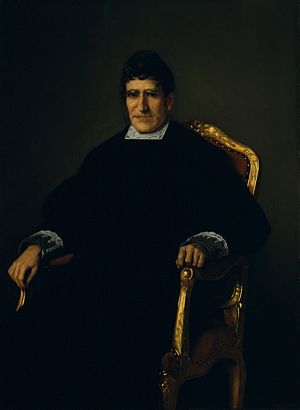José María Calatrava y Peinado facts for kids
Quick facts for kids
The Most Excellent
José María Calatrava
|
|
|---|---|

Portrait by Antonio Gisbert, 1863
|
|
| Prime Minister of Spain | |
| In office 14 August 1836 – 18 August 1837 |
|
| Monarch | Isabella II |
| Preceded by | Francisco Javier de Istúriz |
| Succeeded by | The Count of Luchana |
| Personal details | |
| Born | 26 February 1781 Mérida, Spain |
| Died | 16 January 1846 (aged 65) Madrid, Spain |
| Resting place | Pantheon of Illustrious Men |
| Political party | Partido Progresista |
José María Calatrava y Peinado (born February 26, 1781, in Mérida, Spain – died January 16, 1846, in Madrid) was an important Spanish politician. He served as the Prime Minister of Spain and also as the Minister of State (like a foreign minister) between 1836 and 1837.
Contents
Who Was José María Calatrava?
José María Calatrava was a key figure in Spanish politics during a time of big changes. He was born in Mérida, Spain, and later became a lawyer and a politician. He belonged to a political group called the Partido Progresista, which wanted to make Spain more modern.
Early Life and Career
Calatrava started his career in law. He was known for his strong beliefs in fairness and progress. His skills in law and his dedication to public service helped him rise in politics. He became a respected voice in the Spanish government.
Leading Spain: Prime Minister
José María Calatrava became the Prime Minister of Spain in August 1836. This meant he was the head of the government, leading the country. During his time as Prime Minister, he also held the role of Minister of State. This position was similar to being the main diplomat for Spain, dealing with other countries.
The Constitution of 1837
The most important thing Calatrava's government did was to create and announce a new set of rules for the country. This was called the Constitution of 1837. A constitution is like a rulebook for how a country should be run.
This new constitution brought some big changes. It said that people in Spain would have freedom of religion. This meant they could choose their own faith. However, the constitution also stated that the government would still support the Roman Catholic Church.
Many people in Spain thought these changes were too much, too fast. Because of this, Calatrava's government lost support. He had to step down from his role as Prime Minister in August 1837.
Later Years and Legacy
Even after leaving the Prime Minister's office, José María Calatrava continued to serve his country. He became the President of the Supreme Court of Spain from 1840 to 1843. This is the highest court in the country, showing his continued importance in the legal system.
Calatrava passed away in Madrid in 1846 at the age of 65. He is remembered as a politician who tried to bring modern ideas to Spain, especially through the Constitution of 1837.
See also
 In Spanish: José María Calatrava para niños
In Spanish: José María Calatrava para niños
 | Chris Smalls |
 | Fred Hampton |
 | Ralph Abernathy |

